Manchester’s rich history and cultural heritage come alive on the Private Guided Walking Tour. Led by knowledgeable locals, visitors embark on a captivating exploration of the city’s transformation from a textile manufacturing hub to a global football capital. From iconic stadiums to architectural marvels, the tour immerses guests in Manchester’s remarkable journey – delving into the impact of the Protestant Reformation, the innovations that shaped the Industrial Revolution, and the city’s pivotal role in computing history. With each step, the tour unveils Manchester’s multifaceted identity, leaving the curious traveler eager to uncover more.
Key Points
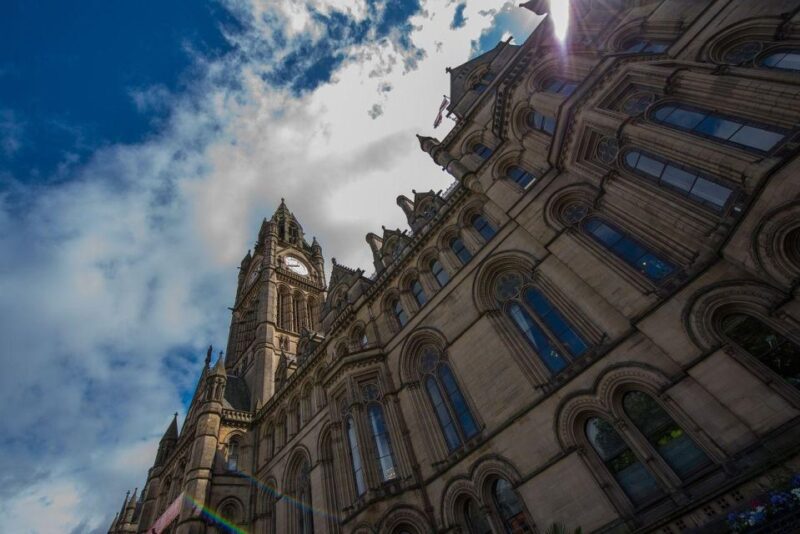
- Discover Manchester’s renowned football heritage with visits to iconic stadiums like Old Trafford and Etihad.
- Explore the city’s rich textile manufacturing legacy through guided tours of historic mills and warehouses.
- Marvel at the neo-Gothic architectural wonders, such as the Town Hall and John Rylands Library.
- Uncover the impact of the Protestant Reformation on Manchester’s religious structures and design.
- Gain insights into the city’s remarkable transformation from a medieval town to an industrial powerhouse.
Football Capital of the World
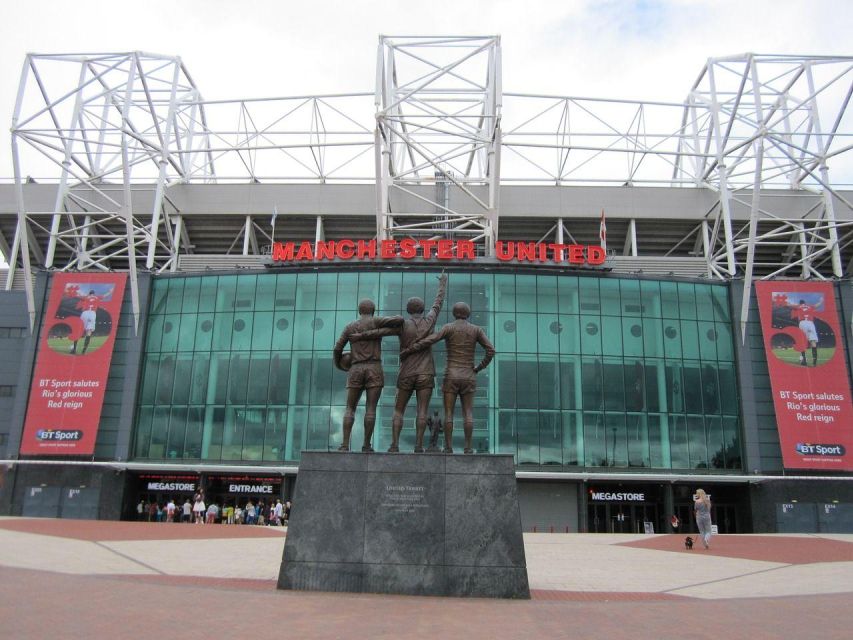
Manchester is renowned as one of the football capitals of the world, home to two of the most successful and prestigious football clubs – Manchester United and Manchester City.
The city’s passion for the beautiful game is unparalleled, with fans from across the globe flocking to witness the intense rivalry between these two giants.
From the iconic Old Trafford and Etihad Stadiums to the thriving football culture that pervades every corner of the city, Manchester’s status as a mecca for football is undisputed.
Whether you’re a lifelong fan or simply curious about the sport, a visit to this footballing metropolis is a must for any true aficionado.
Want to keep it personal? More private experiences we love in Manchester
Textile Manufacturing Legacy
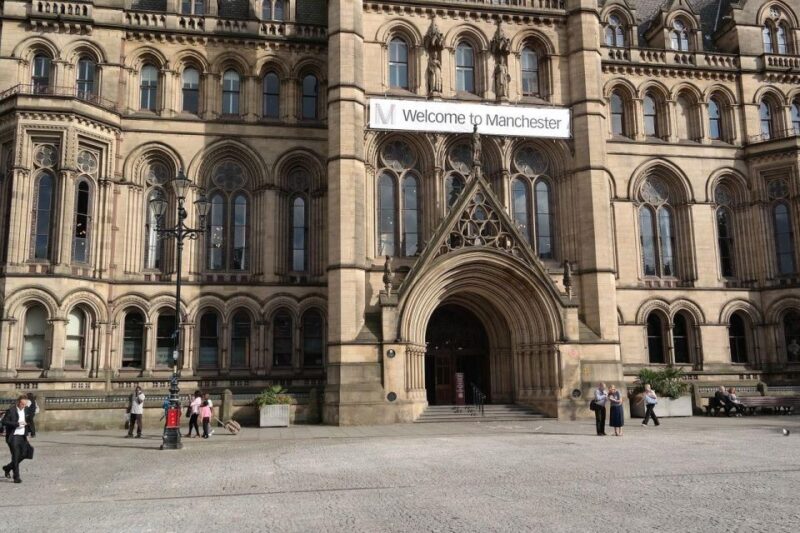
Once the epicenter of Britain’s textile manufacturing prowess, Manchester’s industrial legacy continues to shape the city’s identity, showcasing its transformation from a small market town to a global powerhouse that drove the Industrial Revolution.
During the 18th and 19th centuries, Manchester’s mills and factories were the beating heart of the textile industry, producing vast quantities of cotton, wool, and other fabrics that were exported around the world.
Visitors can still see the grand Victorian architecture that housed these industrial giants, from the ornate facades of the textile warehouses to the imposing chimneys that once belched smoke.
Today, this rich heritage is celebrated in museums and cultural institutions, offering a glimpse into Manchester’s pivotal role in shaping the modern world.
Protestant Revolution’s Architectural Impact
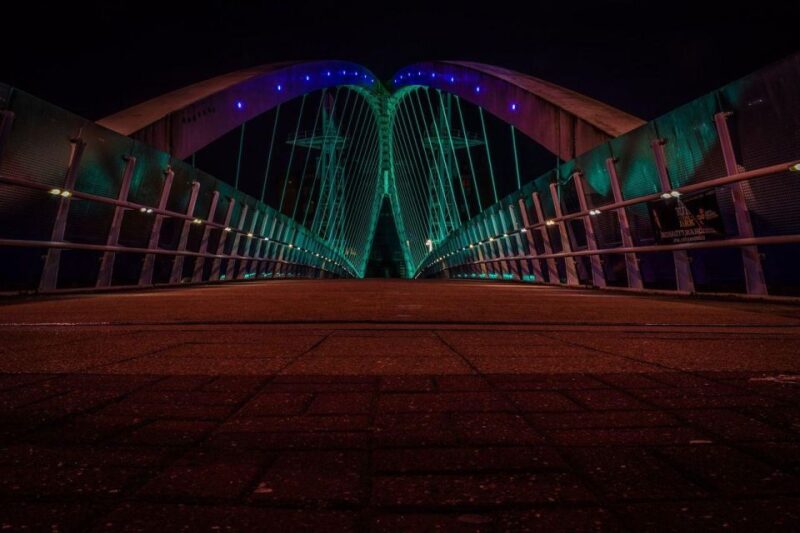
Though the Protestant Reformation swept across Europe in the 16th century, its architectural impact on Manchester’s cityscape is particularly evident.
The city’s religious structures reflect the dramatic shift away from Catholic traditions.
Visitors can witness the Reformation’s influence in Manchester Cathedral, the seat of the Bishop of Manchester.
Originally a Roman Catholic cathedral, it was remodeled in the Gothic style during the Protestant era, shedding ornate Catholic elements in favor of a more austere, minimalist approach.
Similarly, other notable sites like John Rylands Library display architectural styles that depart from traditional Catholic design, embracing the Protestant emphasis on simplicity and function over elaborate ornamentation.
Industrial Revolution Shaping the City
Fueling Manchester’s meteoric rise from town to global industrial powerhouse, the Industrial Revolution fundamentally reshaped the city’s economic and physical landscapes. Textile mills, factories, and warehouses sprang up across Manchester, each one a testament to the city’s central role in Britain’s manufacturing boom.
The influx of workers and capital transformed the urban environment, as dense neighborhoods, polluted canals, and grimy streets became hallmarks of the industrial age.
Rapid urbanization and population growth
Pollution and unsanitary living conditions
Yet, amid the grime and toil, innovations flourished – from breakthroughs in textile technology to the world’s first stored-program computer, developed at the University of Manchester.
Rise of textile mills and factories
Canals and railways enabling mass transportation
Technological innovations and scientific advancements
Manchester’s industrial legacy continues to define the city, its scars and triumphs woven into the fabric of this modern metropolis.
More Great Tours NearbyMedieval Heritage and Transformation
Manchester’s medieval past is palpable throughout the city, where Saxon and Norman influences have left an indelible mark on its architecture and urban fabric.
Visitors can uncover the city’s rich medieval heritage by exploring its historic sites, such as the Manchester Cathedral. This magnificent structure, the seat of the Bishop of Manchester, stands as a testament to the city’s Saxon settlement and its evolution over the centuries.
The Cathedral’s intricate Gothic design and ornate interiors provide a window into Manchester’s medieval past, showcasing the impact of the Protestant Reformation on the city’s architectural and religious landscape.
As travelers explore these historical treasures, they’ll gain a deeper appreciation for Manchester’s remarkable transformation from a town to a thriving metropolis.
Loving the local insights? Here are more guided experiences we recommend in Manchester
- 3-Hour Guided Manchester Food Tour With Lunch
- Manchester: Guided Bar Crawl With Shots and Nightclub Entry
- Manchester: Quirky Smartphone Self-Guided Heritage Walks
- Manchester Self Guided Sherlock Holmes Murder Mystery Game
- Manchester: Self-Guided Musical Outdoor Escape Game
- Manchester: Self-Guided City Sightseeing Treasure Hunt
Neo-Gothic Town Hall Landmark
As visitors explore Manchester’s medieval heritage, they’ll also encounter one of the city’s most iconic landmarks – the Town Hall.
Built in 1877 during the height of the Industrial Revolution, this neo-Gothic masterpiece stands as a testament to Manchester’s rapid transformation into a thriving metropolis.
The Town Hall’s striking architecture features:
- Ornate stone carvings and intricate spires that soar skyward
- A grand clock tower that dominates the city skyline
- Magnificent stained-glass windows that bathe the interior in vibrant hues
- Ornamental archways and columns that evoke the grandeur of a bygone era
- Beautifully maintained gardens and courtyards that offer a tranquil respite from the bustling streets
Visitors can marvel at the Town Hall’s blend of historical elegance and modern significance, a true symbol of Manchester’s evolution.
John Rylands Library Significance
The John Rylands Library stands as an architectural and cultural jewel in Manchester’s rich tapestry, named after the city’s foremost textile manufacturer, first multi-millionaire, and philanthropist.
This stunning neo-Gothic structure, completed in 1900, houses one of the finest collections of rare books and manuscripts in the world.
Visitors can marvel at the intricate stonework, stained glass windows, and grand reading rooms, all designed to create a sense of wonder and reverence for the printed word.
The library’s holdings include significant theological and historical documents, offering a window into Manchester’s past and its role in the social and industrial revolutions that shaped England.
A visit to the John Rylands Library is a must for any lover of literature and architecture.
First Stored-Program Computer Creation
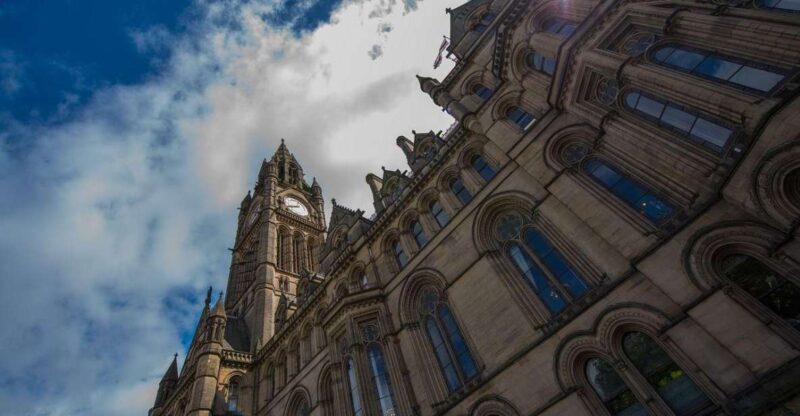
Alongside Manchester’s rich industrial and architectural legacy, the city also played a pivotal role in the history of computing. The first computer capable of storing programs and having memory was created in Manchester, marking a significant milestone in the evolution of modern computing.
This groundbreaking achievement was accomplished by a team of researchers at the University of Manchester, led by the brilliant scientist Tom Kilburn. The key features of this pioneering computer included:
- The ability to store programs and data in electronic memory, eliminating the need for cumbersome punch cards
- A flexible design that allowed for the execution of a wide range of algorithms and calculations
- Advanced logic circuits that enabled complex computations and decision-making
- The use of cutting-edge vacuum tube technology for processing power
- A visionary approach that laid the foundation for the modern digital era.
Frequently Asked Questions
What Is the Dress Code for the Walking Tour?
The dress code for the walking tour is casual and comfortable. Participants should wear weather-appropriate clothing and sturdy walking shoes to ensure they can fully enjoy the tour and navigate the city’s streets with ease.
Are There Any Restroom Facilities Available During the Tour?
There are typically restroom facilities available at various points along guided walking tours. Tour organizers often plan routes that include access to public restrooms or facilities at landmarks visited during the tour.
Can the Tour Be Customized to Suit Our Interests?
Yes, the tour can be customized to suit the interests of the group. The private nature of the tour allows for flexibility to focus on the aspects that most appeal to the participants.
Is Photography Permitted Throughout the Tour?
Yes, photography is generally permitted throughout the tour. The tour guide will provide guidance on appropriate times and places to take photos to ensure an enjoyable and informative experience for all participants.
Do We Need to Bring Any Special Equipment or Supplies?
No special equipment or supplies are required for this tour. Comfortable walking shoes and a camera to capture the city’s architectural gems and historic landmarks are recommended, but not mandatory. The tour guide will provide all necessary information during the excursion.
Recap
The Manchester Private Guided Walking Tour offers visitors a captivating glimpse into the city’s rich history and cultural heritage.
From its renowned football clubs to its groundbreaking contributions to the Industrial Revolution, the tour provides a comprehensive understanding of Manchester’s multifaceted identity.
Guided by knowledgeable locals, the walk immerses guests in the city’s remarkable transformation, leaving them with a deeper appreciation for its architectural marvels and pivotal role in shaping the modern world.
You can check availability for your dates here:More Walking Tours in Manchester
More Tours in Manchester
More Tour Reviews in Manchester
- Manchester Scavenger Hunt and Sights Self Guided Tour
- Private Transfer From Manchester Airport (Man) to Farnworth
- Private Transfer From Manchester Airport (Man) to Salford
- Breathtaking Manchester – Walking Tour for Couples
- Manchester–Boston Regional Airport to Manchester – Arrival Private Transfer
- Manchester to Manchester–Boston Regional Airport – Departure Private Transfer
Not for you? Here's more things to do in Manchester we have recnetly reviewed
- 2 Best Dining Experiences In Manchester
- 2 Best Dinner Tours In Manchester
- 7 Best Cruises And Boat Tours In Manchester
- 5 Best 3 Day Tours In Manchester
- 4 Best Lunch Experiences In Manchester
- 5 Best Food Tours In Manchester
- North Wales and Caernarfon Castle From Manchester
- Arrival Private Transfer: Manchester Airport MAN to Liverpool in Business Car
- Christmas In Manchester: Private Experience With A City Host
- MUFC Match Day Travel
- Manchester–Boston Regional Airport to Manchester – Round-Trip Private Transfer
- Private Transfer From Manchester Airport (Man) to Alderley Edge
